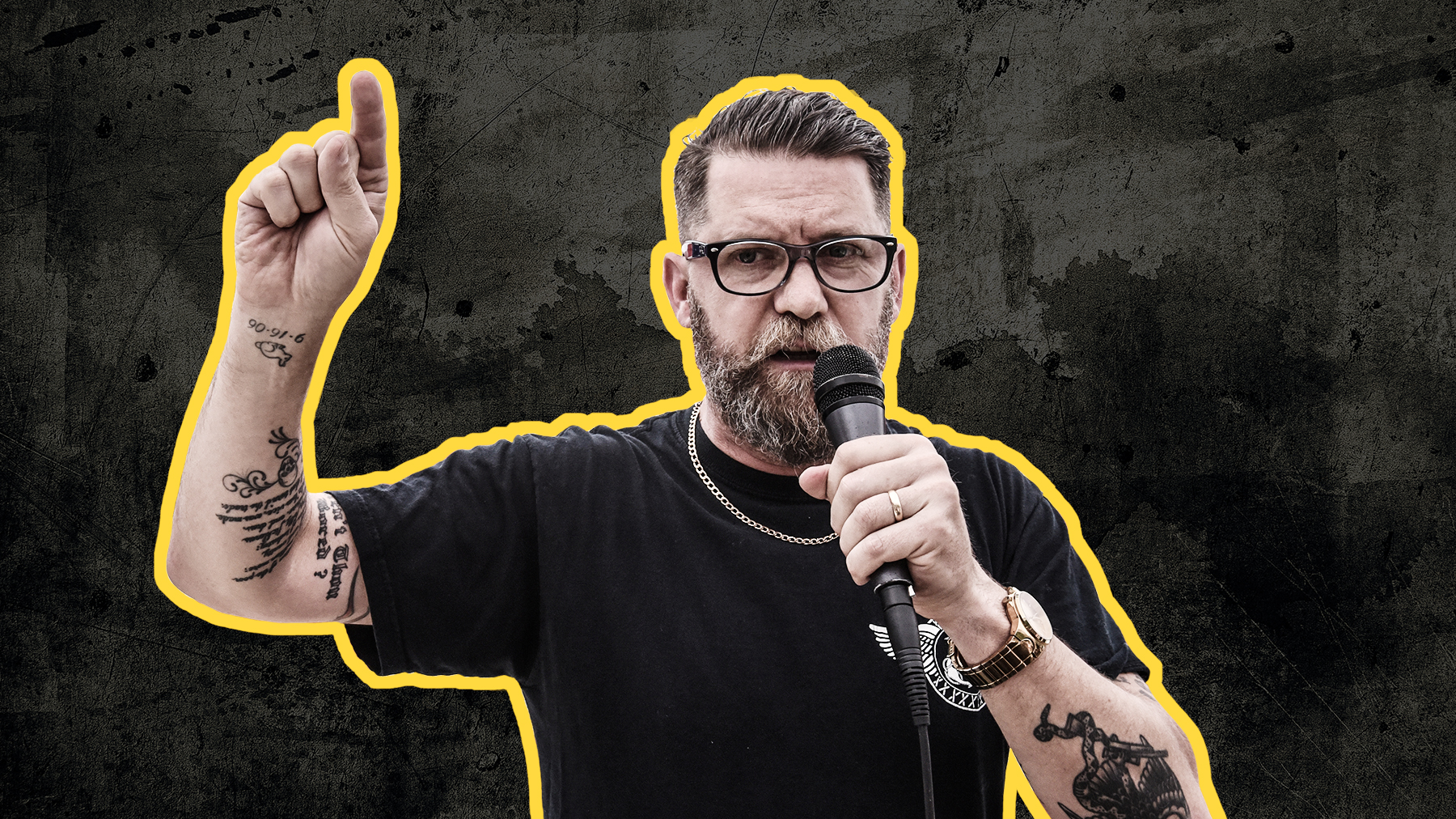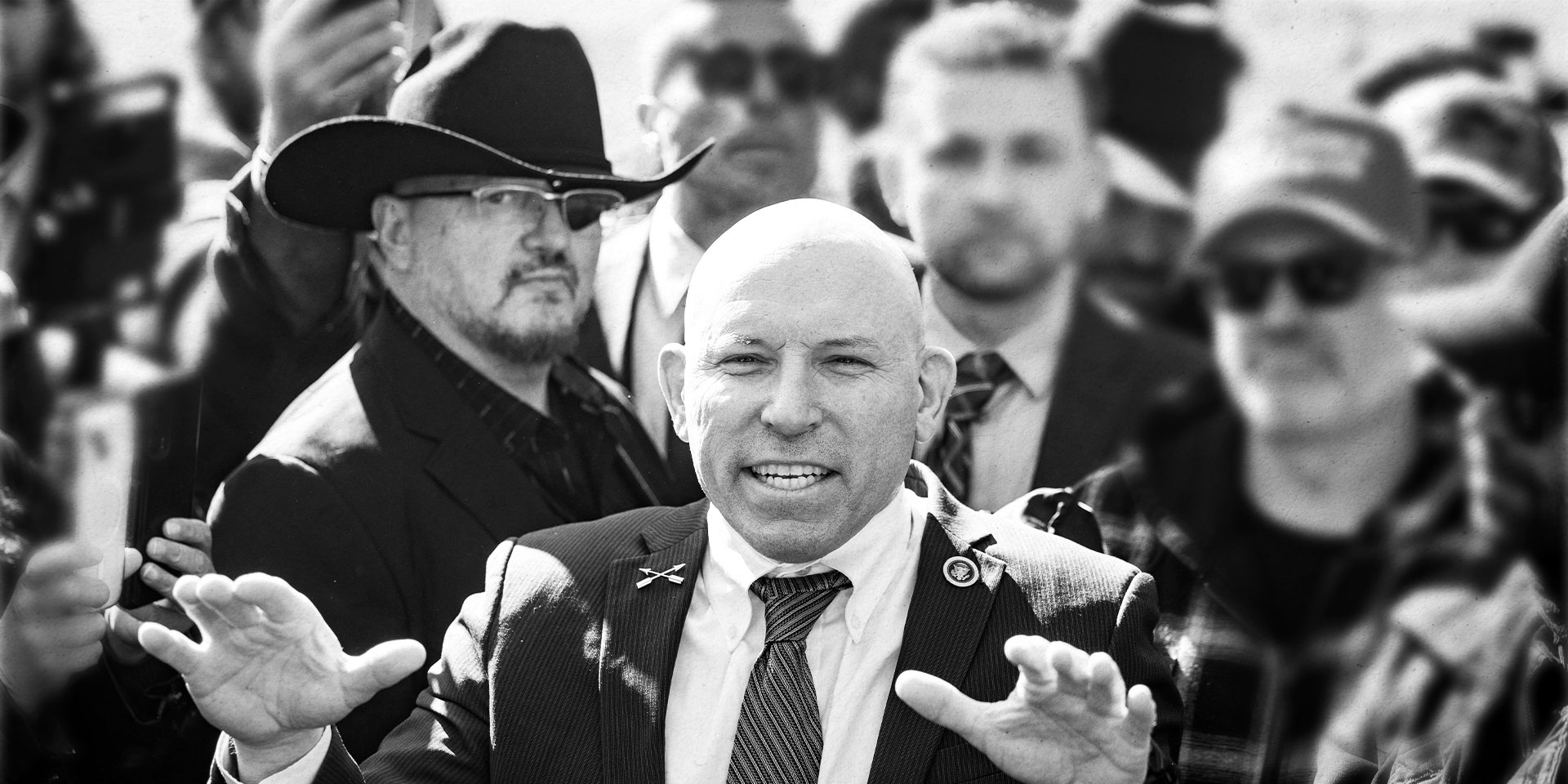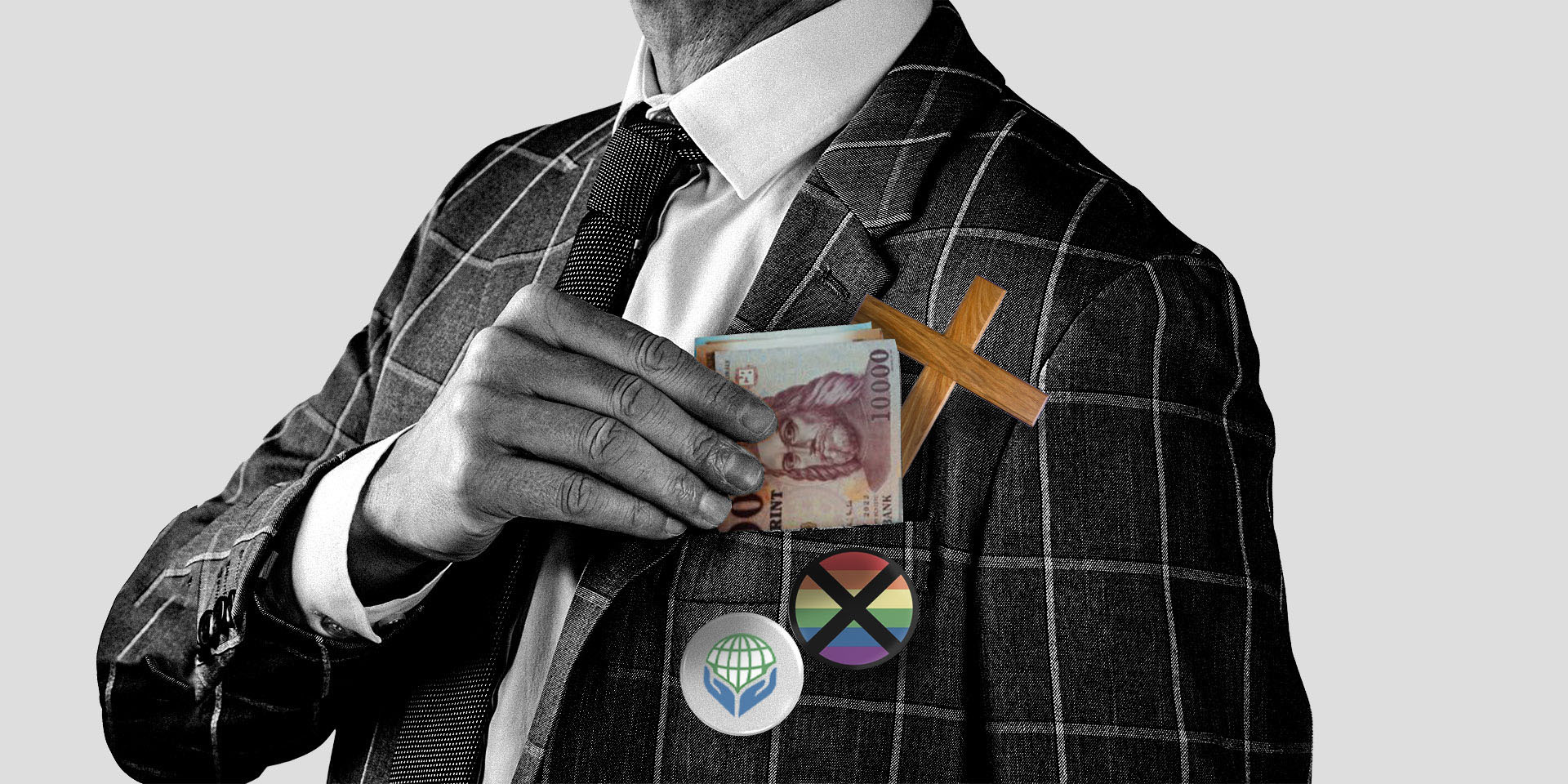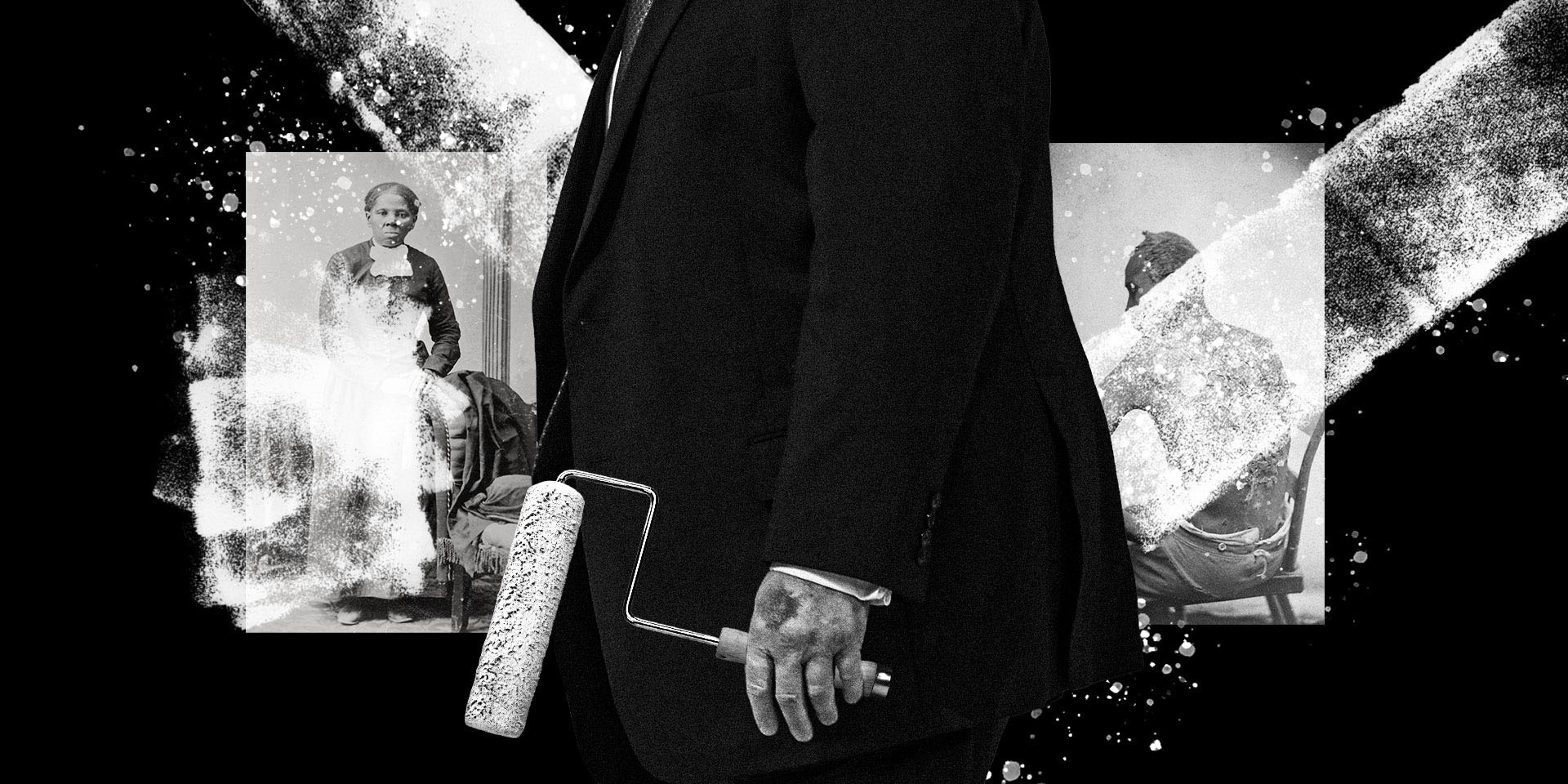Back in 2011, Gavin McInnes, the writer and talk show host who would later found the Proud Boys, published his thoughts about anti-gay and racial slurs on the paleoconservative website Taki’s Magazine.
The essay, titled “I’m Not a Racist, Sexist, or a Homophobe, You N—– S— F—–,” laid out a justification for using hateful words and phrases. His argument was essentially that they were simply “swear words” and that no one should assume what he means by using them.
From his essay (capitalizations his):
Using words such as “f—–,” “n—–,” and “s—” are obviously all about context. They are swear words. To go up to an old black guy and yell N—– in his face is exactly like going up to an old white lady and yelling C— in her face. It is not racist, sexist, or homophobic to swear. It’s just very rude.
What is more than rude, however, is to insist you know my motive for swearing. To police language based on thought is to police thoughts. It’s nobody’s business what our motives are.
In recent days, McInnes has been using a similar argument in response to videos that showed members of the Proud Boys viciously attacking people on the streets of New York City following a talk he gave Oct. 12 at the Metropolitan Republican Club in Manhattan.
In one video, a member of McInnes’ group could be heard screaming the word “f—–” as he repeatedly kicked a person curled up on the sidewalk. According to McInnes, the attack began after the victims, who he has claimed were antifascist activists, allegedly stole a “Make America Great Again” cap from a member of the Proud Boys.
“The antifa kid they beat up was in tears,” McInnes said with a chuckle during the opening minutes of his “Get Off My Lawn” podcast a day after the attack. “He was crying. Now, while this person’s crying, I’m sorry, but ‘f—–’ is a handy term.”
The Proud Boys have been designated as a hate group by the Southern Poverty Law Center for their bigoted rhetoric disparaging women, Muslims and other groups, so such vulgarity is hardly out of character. But in an interview with Newsmax just two days later, McInnes toned it down.
“He didn’t mean it like it was some sort of homosexual attack,” McInnes said. He censored himself from repeating the word itself during the interview, using the phrase “F-word” in its place: “When someone’s adrenaline is pumping, he’s going to say, ‘Are you brave now, f-word?’”
The tactic is classic McInnes. Over the years, he has fancied himself as something of a hipster conservative. He often casts bigotry and slurs as some form of taboo-bending hijinks rather than as worn-out and stale ideas about gender, sexuality, race, religion and equality. Instead of the aging punk he makes himself out to be, his ideologies are more in line with the status quo in which straight white men reign. He’s obedient to power, not a rebel against it.
That dynamic goes a long way to explaining his frequent use of anti-gay slurs. For at least 15 years, dating back to his time as co-founder of VICE Media, McInnes has used the word in numerous essays in social media posts. He often portrays it as a term that doesn’t carry any inherent bigotry — even describing himself in one essay as “a complete f—— f–” for the emotions he felt being a dad. But even in that self-deprecating way, McInnes has routinely used the word as a synonym for weak or unmasculine. It’s a term of contempt. At times he has outright described gay men as “f——.”
Here are a few ways McInnes has used the anti-gay slur since 2003 (links omitted on purpose):
1. VICE, November 2003
McInnes wrote a feature, titled “The VICE Guide to Happiness,” for the magazine he co-founded. The piece, a rambling advice column, began with a brief introduction explaining that he was about to give his readers reasons to be happy when negative things happen.
“You give me a reason you’re bummed out and I’ll give you a reason not to worry about it. OK?” McInnes wrote. “Look at that frown. I see those little corners turning upwards. There we go, I see a smile starting up, you little f–.”
2. VICE, November 2005
In another feature — “The VICE Guide to Picking Up Chicks” — McInnes used the slur repeatedly. But now, he was using it to refer to actions he believed would make straight men appear gay or unattractive to women.
Here’s one example:
The problem with really wanting to get laid is you look like someone who really wants to get laid. … We know you want to f— Julie. We all want to f— Julie. Just don’t admit it to anyone. Not even to yourself. Even if a close female friend, one you trust, asks if you want to f— Julie, make a joke like, “I want to f— MARK, don’t you? Meow!” Nobody needs to know you have a penis. Of course, you have to be careful with this kind of attitude and not be too f—-.
And another:
As you get older your feelings become more and more fragile. That’s because your character gets bigger every year. When you’re 20 you’re basically a f–.
3. Taki’s Magazine, April 2011
After leaving VICE, McInnes went on to write a semi-regular column for Taki’s Magazine, a website that published the work of white nationalists Richard Spencer and Jared Taylor, among others on the far-right fringe. In one of his columns, McInnes wrote that Spencer was the one who got him the job there and that he “comes across as perfectly reasonable in conversation.”
McInnes frequently used anti-gay and racial epithets in his Taki’s Mag columns. In one instance, before the #MeToo movement took hold, he lamented that, according to him, innocent men were often wrongly accused of sexual harassment. He wrote that his father had been accused of workplace misconduct and eventually cleared, and separately, so had he.
“I was asked to go to sensitivity training after being overheard saying, ‘I love f—’ at work,” McInnes wrote. ‘No f– was present during this horrible hate crime, and these ‘charges’ were also dropped.”
4. Taki’s Magazine, November 2011
In a later piece for Taki’s Magazine titled “Apologies Are for F—,” McInnes published what amounted to an admission that his views were outdated rather than edgy. He wrote that he longed for “the good old days” (yes, he used that cliché) when slurs were socially acceptable.
From the essay:
Back in the good old days, everyone laughed when Mrs. Jefferson said “n—-, please” and Archie Bunker said England’s “whole society is based on a kind of a f—–.” We were less uptight thirty-five years ago. What country is this — Iran?
What set McInnes off was that director and producer Brett Ratner had recently written a letter of apology for using the word “f—.” McInnes described it as the “f——- apology letter I’ve ever read” and referred to LGBT advocates as “the Pink Mafia.”
Variations of the same anti-gay slur appeared nine times in the column.
Throughout the piece, he embraced a common fallacy on the far-right — that free speech means never having to face social consequences for what you say. And he implied that obsolete speech is the same thing as banned speech.
“I honestly can’t think of any joke or even publicly spoken thought that should be banned or censored,” McInnes wrote. “I certainly can’t think of one that should require a letter of apology or a symbolic resignation.”
5. ‘How to Piss in Public,’ 2012
In his memoir, published by the Simon and Schuster imprint Scribner, McInnes elaborated on his experience having to undergo sensitivity training for using the anti-gay slur. The details in the book version differ in a few ways from the one he published with Taki’s Magazine.
McInnes wrote that the training was mandated by VICE, which at some point had grown into a company he said he didn’t recognize. As part of the new culture, he apparently couldn’t get away with using slurs anymore.
The turning point for me was during a meeting about some French homo who had begun choosing products for us to buy en masse and sell on the site. He was a chubby man with corny streetwear, but I liked him enough. “Now, Gavin,” the stranger leading the board meeting said, “you’re going to be working with him so we want to make sure you guys get along.”
“Sure,” I said, shrugging. “I love f——.”
The conference room was full of faces I didn’t recognize, and those were the faces that didn’t laugh. The next day I got pulled aside by some office-manager type who told me I was going to have to do sensitivity training. I thought he was kidding.
McInnes wrote in the book that the lawyer who conducted the training “thought the whole thing was as stupid as I did.” And afterward, McInnes “went back to work grumpy.”
Later in the book, McInnes recounted another tale of his time at VICE. This time, it was about how he got into a physical fight with a gay photographer who had published photos in VICE. The title of the chapter was “A F—– Kicked My Ass.”
McInnes wrote about how the photographer had started to gain some notoriety on his own and then began ignoring McInnes’ phone calls. So McInnes met the photographer at a bar to explain to him “what loyalty is and how he’d be nowhere without me.” After about an hour, McInnes wrote, he decided he wasn’t getting through to the photographer and started to leave the bar.
McInnes filled the rest of the chapter with a tale of throwing punches and getting tossed into piles of garbage cans and parked cars until finally pleading for the photographer to stop.
The chapter ended with a conversation about the fight McInnes said he later had with the late New York artist and graffiti writer Dash Snow. McInnes quoted Snow asking him: “What’s it like to get your ass kicked by a f—–?”
6. Thought Catalog, February 2014
McInnes attempted to use the slur in a self-deprecating way in an essay called “Having Kids Turns You Into a Complete F–.” In it, he described his role as a father by using a bunch of stereotypes of gay men — they cry a lot, they gossip, they’re into fashion and more.
McInnes, who lives with his wife and kids in New York, described himself as a “f–” or a “complete homo” throughout the essay, before closing with a paragraph full of stereotypes:
I used to be cool. I used to be a tough. I used to fight Nazi skinheads and play in a band and get kicked out of school for drugs. I used to get so laid, I had every STD in the book but AIDS. Now I am AIDS. I cry at puppies, assemble looks, try new hairdos, dish, and dance like a girl to the gayest music you’ve ever heard. I’m a complete f—— f– and I think I like it.
7. Thought Catalog, August 2014
McInnes also used the slur in an essay attacking transgender people in which he wondered why trans women don’t just wear makeup and identify as a gay man.
The essay, “Transphobia Is Perfectly Natural,” is one of McInnes’ most hate-filled pieces of writing. It’s also a lengthy display of his outdated comprehension of gender.
Here’s a small portion of the essay:
We’re all transphobic. We aren’t blind. We see there are no old t——-. They die of drug overdoses and suicide way before they’re 40 and nobody notices because nobody knows them. They are mentally ill gays who need help, and that help doesn’t include being maimed by physicians. These aren’t women trapped in a man’s body. They are nuts trapped in a crazy person’s body. I see them on the streets of New York. They are guys with tits and a sweatshirt. They wear jeans and New Balance. “What’s the matter with simply being a f– who wears makeup?” I think when I see them. You’re not a woman. You’re a tomboy at best. Get f—– in the ass.
8. Taki’s Magazine, September 2016
McInnes even used the anti-gay epithet in the column that announced the formation of the Proud Boys. The group began, he wrote, by “laughing at the politically correct culture they insist we take seriously.”
“Young American men,” the 40-something wrote, were fed up with “apology culture.”
“They tried being ashamed of themselves and accepting blame for slavery, the wage gap, ableism, and some f—bashing that went on two generations ago, but it didn’t work,” McInnes wrote. “So they’re going with their gut and indulging in the natural pride that comes from being part of the greatest culture in the world.”
Photo illustration by SPLC






